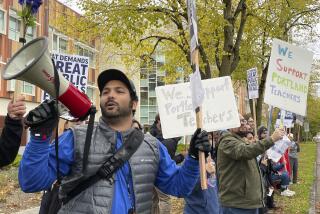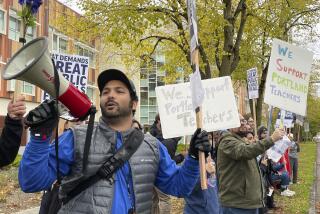Chicago teachers strike: School district optimistic; union less so
Negotiators went back to the bargaining table Tuesday morning as Chicago parents coped with the second day of a teachers strike. School district officials continued to insist that an agreement could be quickly done; their union counterparts were less optimistic.
School board President David Vitale took to the morning airways, seeking to reassure parents that a deal was likely -- at least from the administration’s point of view. The job action has left about 350,000 students without teachers at the third-largest district in the nation.
“Frankly, we thought it could be done last week,” Vitale said in an interview on the “WGN Morning News” program. He seemed to dismiss the possibility of outside legal action to end the strike, saying: “That’s really not the way to solve this. The way to solve this is us to get an agreement and get our kids back in school.”
PHOTOS: Chicago teachers strike
Teachers, meanwhile, went into their second day of picketing, with union President Karen Lewis telling reporters that the school district has not changed its offers on two of the more contentious issues: performance evaluations and how to deal with teachers who are laid off for budgetary reasons and then seek to return.
Conspicuously in the background was Mayor Rahm Emanuel, the target of much of the teacher ire. Among the groups of picketing teachers, at least one person often carries a sign to remind everyone where the real power lies: “Teaching students the difference between Right and Rahm.”
Emanuel and the 26,000 teachers have sparred before. When he took office last year, the mayor withdrew a 4% raise for teachers in an effort to address budget shortfalls. He then asked the union to reopen its contract and accept 2% pay raises in exchange for lengthening the school day for students by 90 minutes. The union turned a thumbs-down on both requests.
Emanuel isn’t the first government executive to fight with a public employee union, nor is he likely to be the last. Wisconsin Gov. Scott Walker, a conservative Republican, famously fought his unionized workers -- much to the joy of Democrats who helped push a recall election that failed.
As a Democrat and former chief of staff to fellow Chicago resident President Obama, Emanuel might have thought he could have an easier time of it, but across the nation, top officials of cities and states -- of both parties -- are increasingly looking at employee salaries and benefits as costs that need to be trimmed in tough financial times.
On Monday, Emanuel said there will be time to deal with politics -- but not now.
“Don’t worry about the test of my leadership. That gets tested every day. There’s not a day that isn’t a challenge,” the mayor said at a news conference. “The only test that matters to me is the test these kids take on whether, when you’ve got a kid going into first grade, do they know the letters? By third grade, can they read? By fourth grade, can they do the basic math? That’s the test that matters here.”
Test scores are important to officials and to the growing number of parents’ groups seeking better education goals. Some educators and parents want testing to be part of the teacher-evaluation process, but union officials are generally cooler to the move. They argue that evaluations and other work rules are part of the contract negotiating process.
Emanuel has argued that the current walkout is really about just two issues, a new evaluation process and principals’ ability to hire the teachers they want. Union leaders see the issues differently, saying the strike is about job security and the new evaluation process, which they say could cost 6,000 teachers their jobs. City officials dismiss that number as too large.
Meanwhile, the district announced on its website that about 18,000 students showed up at school on Monday, the first day of the strike. Some facilities were offering limited activities and, perhaps most important, the usual free meals for those in need. But the number of students able to participate was complicated by safety issues involving Chicago gangs.
Rose Davis walked her two young grandchildren to class in Englewood, about five blocks further than the school they normally attend.
“They had to go out of their home zone,” Davis, 47, told the Associated Press. “You never know what gang violence is going on the other side of the zone.”
ALSO:
9/11 -- 11 years later: A nation pauses to mourn anew
Ice threat halts Shell’s drilling in Arctic Ocean after one day
Gay marriage: NFL’s Brendon Ayanbadejo, Chris Kluwe play offense
More to Read
Start your day right
Sign up for Essential California for news, features and recommendations from the L.A. Times and beyond in your inbox six days a week.
You may occasionally receive promotional content from the Los Angeles Times.







